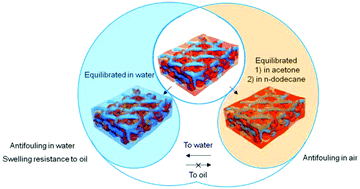Heteronetwork organohydrogels with exceptional swelling-resistance and adaptive antifouling performance†
Abstract
The integration of hydrophilic and oleophilic components in many organisms (cytomembrane, antifreeze protein molecules, etc.) provides a vital foundation to exert the biological functions related to the activities of life. In this study, a simple and universal strategy has been reported to obtain a robust multi-network organohydrogel based on incompatible hydrophilic and oleophilic polymer chains. The heterogeneous networks enable organohydrogels to swell optionally in liquids with different polarities. Thus, the surfaces of the multi-network organohydrogels display adaptive wettability owing to the reconfigurable surface chemistry induced by different dispersion media, which enables multi-network organohydrogels for promising applications in adaptive antifouling surfaces. In addition, water as the first dispersion medium can penetrate the multi-networks completely, while organic liquids with a low polarity interact with the organic networks as the hydrophilic networks are not hydrated. Thus, the hydrated multi-network organohydrogel displayed a remarkable swelling-resistance to organic liquids with a low polarity and stable mechanical properties.



 Please wait while we load your content...
Please wait while we load your content...